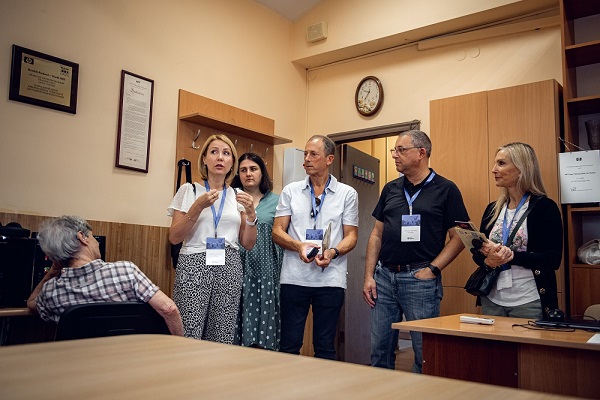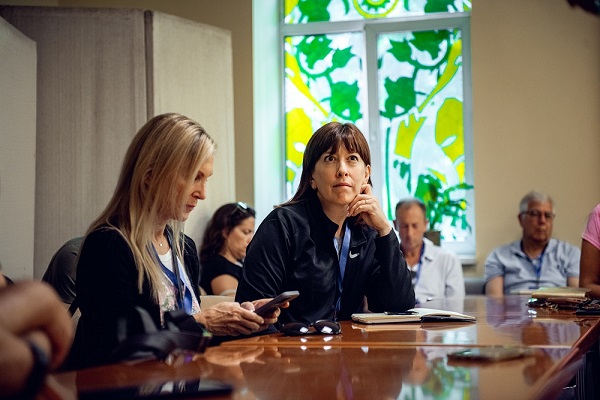08/24/2023
JFNA Mission Provides Aid, Human Connection in Ukraine
- Share This Story

Fly-in mission participants, including J. David Heller, JFNA national campaign chair and past Cleveland federation board chair, at center, visit JDC Hesed Center’s Computer Hub which hosts classes for the elderly, teaching them computer skills so they can better communicate digitally with their family and feel less isolated. Submitted photos.
COURTNEY BYRNES | CJN
Article reprinted with permission from Cleveland Jewish News
As the Jewish Federations of North America sent a delegation to Ukraine on a first-of-its-kind mission since the war broke out, the Federation leaders assessed the needs and witnessed how life goes on with the help of community philanthropy and on-the-ground partners.
Among the 12 Jewish Federation leaders on the four-day mission were Erika Rudin-Luria, president of the Jewish Federation of Cleveland; J. David Heller, JFNA national campaign chair and past Cleveland federation board chair; and former Clevelander Eric Fingerhut, JFNA president and CEO.
The group visited internally displaced people at the American Jewish Joint Distribution Center’s Hesed Arieh in Lviv and a hotel in Truskavets, and witnessed an aliyah preparation seminar in Mukachevo. They also visited campers at The Jewish Agency for Israel’s overnight summer camp in Polyana and the JDC-Lauder Youth Camp in Szarvas, Hungary, where the mission concluded with briefings from the Jewish Agency, JDC and the JCC Budapest Balint Haz.
“(We) really just got to see the gamut of how people are being helped throughout the country,” Heller told the Cleveland Jewish News Aug. 21. “And we were there with the JDC, with The Jewish Agency, with Chabad. (It was) pretty fascinating.”
While Heller has taken part in three missions to the region since Russia invaded Ukraine in February, 2022, this was the first JFNA mission inside the country. Other trips focused on providing humanitarian aid to those fleeing across the border and making their way throughout Europe or to Israel on aliyah.
But inside Ukraine, Heller said “an entire nation is traumatized” as the Federation group saw the work of the JDC and Jewish Agency with the Israel Trauma Coalition providing support to those who had to flee their homes. Their first night in Lviv was spent in a bomb shelter as bombs went off less than a mile away. The next day, the group visited the chesed center where the Ukrainians take part in activities and trauma support groups.
As such support systems are already in place to help, Heller said the Jewish community there is doing well and is helping internally displaced people find housing, employment and a sense of community, whether at a synagogue, or in youth groups or senior groups.
“While at the beginning of the war, they may have left the country and gone to Europe and gone to Israel, now many of them are just being displaced within the country, trying to find safe haven within the country,” Heller said. “And the Jewish community is responding by giving people that sense of respite and relief in some areas.”
As Heller recently took over as JFNA’s national campaign chair, his previous role as chair of JFNA’s Ukraine Emergency Campaign has rolled into his current position. He has been charged with leading a task force to assess the needs in Ukraine and surrounding countries.
So far, Jewish federations in the United States have raised more than $90 million for Ukraine, which has been deployed, yet the needs to provide safety, security and warmth continue. Heller said a firm dollar amount has not been set, but soon JFNA will be coming back to the communities to let them know how they can help and what will be needed.
Thanks to the Jewish Federation of Cleveland’s and other communities’ annual campaigns, and overseas partnerships, Rudin-Luria told the CJN the global Jewish community was able to quickly mobilize at the start of the war to support the needs in Ukraine.

Fly-in mission participants, including Erika Rudin-Luria, president of the Jewish Federation of Cleveland, right, sit around the table at the JDC Hesed Center in Lviv (which is supported by Jewish Federations funding) with elderly Ukrainians attending a Day Center activity where they were learning Jewish history. Submitted photo.
“The annual Campaign for Jewish Needs is very important when it comes to our funding of these needs in Eastern Europe,” she said. “Beyond that, we have raised over $5.6 million, Cleveland has, in order to assist with the needs around the war in Ukraine. And one of the reasons for this leadership fly-in was really to assess what the needs are right now so that we can determine how it is that we can make an impact on people’s lives going forward in this.”
Rudin-Luria and Heller took part in a mission to the Poland border just two weeks into the war as 50,000 people were crossing the border. About two months later, Rudin-Luria returned with another leadership group, traveling a few kilometers into Ukraine to visit an Israeli field hospital set up by the Sheba Medical Center. But, joining this first mission into Ukraine was “surreal,” she said.
Arriving in Lviv, she said it looked “like any normal city during the summer” with people outside and children playing. But speaking with them, the group learned more about what they’ve gone through.
“We immediately started to hear from them about the trauma that they were experiencing, about their efforts – in their words – to stay human,” Rudin-Luria said. “I heard a lot of similar language to that throughout the trip. It wasn’t that people were talking about normalcy, they were talking about staying human. And a significant piece of staying humans was through contact with others.”
Another place this was evident was at the Jewish overnight camps, where she said children had a sparkle in their eyes. Over half of the campers had never been to camp before and many came from active warzones, finding respite, comfort and safety at camp.
“Everybody is supporting each other in these places,” Rudin-Luria said. “What’s amazing is the resilience of children and the huge smiles and the fun and the dancing and everything that camp does for any of our kids to allow us to grow as a person.”
To address the continued humanitarian and trauma-relief needs, she said humanitarian aid needs to be delivered in a way that provides connection and community for those who remain in Ukraine.
While the Jewish community in Ukraine is only over 200,000 people, this mission reminded her that “This is a part of the world that actually birthed a lot of our Jewish community, and it was impossible to not feel that level of connectedness and familiarity.”

